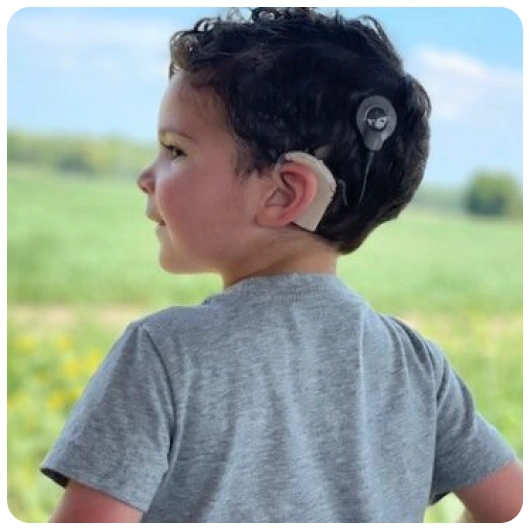Pediatric cochlear implant surgery is a crucial operation for children with severe to profound hearing loss. The procedure involves inserting a small electronic device into the inner ear, allowing the child to sense sound through direct stimulation of the auditory nerve. This significantly improves the child's language and communication abilities. The surgery involves several key steps:
- Insertion of Electrode Array: An electrode array is inserted into the cochlea, a part of the inner ear.
- Placement of Receiver: A receiver is placed beneath the skin behind the ear.
- External Processor: An external processor captures sound and converts it into electrical impulses.
- Stimulation of Auditory Nerve: The impulses are transmitted to the electrode array, stimulating the auditory nerve, thereby improving the child's ability to hear and communicate.
Pediatric Cochlear Implant Surgery at Medicover Hospitals
Medicover Hospitals is renowned for its exceptional performance in pediatric cochlear implant surgeries. They utilize advanced surgical procedures and state-of-the-art technologies to ensure the best possible outcomes for young patients. Medicover Hospitals offers comprehensive care, which includes:
- Pre-Operative Evaluations: Thorough assessments to determine the suitability of the surgery.
- Post-Operative Rehabilitation: Support and therapy to maximize the benefits of the implant.
- Continuous Assistance: Ongoing support to ensure long-term success and improvement in hearing outcomes.
Medicover Hospitals provides cost-effective solutions, making this life-changing treatment accessible to a broader range of families. Parents considering pediatric cochlear implant surgery can trust Medicover Hospitals for their experience, compassionate care, and dedication to improving the quality of life for children with hearing problems.

Why Choose Medicover Woman and Child Hospitals

0
+ Expert Doctors
0
+ NICU & PICU Support
0
K+ Normal Delivery
0
+ Beds FacilityFrequently Asked Questions
What should I avoid after cochlear implant surgery?
Following cochlear implant surgery, avoid activities that could damage the head, dislodge the implant, and strain muscles. For four to six weeks, avoid lifting heavy bags, children, and vacuums. Also, avoid sudden head movements, water, strenuous physical activity, high-speed rides, martial arts techniques, and electric devices.
What is the best age to get a cochlear implant?
FDA permits cochlear implants for children 12 months old with severe hearing loss, potentially benefiting from the early nine months. Early speech development is crucial for age-appropriate language.
Is cochlear implant surgery painful?
General anesthesia is commonly used in cochlear implant surgery to induce a sleep-like state and prevent pain. For three to five weeks after surgery, patients may experience headaches, mild to severe pain, vertigo, ear popping, and swelling. The scar left by the incision will gradually disappear over time.
What to eat after cochlear implant surgery?
After cochlear implant surgery, resume your regular diet with bland, low-fat foods like rice, grilled chicken, bread, and yoghurt. Avoid soft meals to reduce the impact of chewing on your surgical ear, and eat soft foods to alleviate stomach upset.
What is the success rate of cochlear implants?
Cochlear implants have a high success rate, with over 90% of individuals with substantial hearing loss improving their speech comprehension. However, outcomes can vary based on factors like implant placement age, hearing loss severity, and rehabilitation adherence.
Ready to take control of your health journey?
Book your appointment now and start your path towards wellness today!